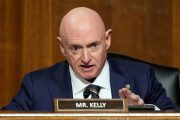
As part of his latest military budget proposal, Florida Governor Ron DeSantis (R) on Thursday proposed bringing back the Florida Guard, a military force that would be exclusively under state control.
Unlike the Florida National Guard, which can be activated by the federal government under the president’s command, state defense forces cannot be called into federal service. Currently, 21 states, including Texas, California, and New York, have active state defense forces.
The Florida State Guard (FSG) was active during World War II, when it served as a replacement state defense force while the Florida National Guard was deployed abroad. The FSG was disbanded in 1947, although state law allows the governor of Florida to create and maintain a Florida state defense force should they decide to do so.
Under DeSantis’ proposal, the Guard would consist of 200 volunteer civilians “trained in the best emergency response techniques” in order to aid in natural disasters and other emergencies.
DeSantis noted that the proposed unit would “not be encumbered by the federal government,” giving him “the flexibility and the ability needed to respond to events in our state in the most effective way possible.” The governor is asking the Florida Legislature for $3.5 million to establish the unit.
DeSantis is also requesting $87.5 million to expand the existing readiness center in Miramar and to establish three new armories in Homestead, Gainesville and Malabar; $8.9 million for existing armory maintenance; $2.2 million for a new headquarters for the National Guard Counter Drug Program; and $5.1 million to support Florida National Guardsmen seeking higher-education degrees.
“We are proud of our veterans and active-duty military members and proud of what our communities do to support them,” DeSantis said. “Florida is one of the most veteran friendly states and I think there are very few places that you would rather be on duty than in the state of Florida. As a veteran, I really appreciate what everyone who wears the uniform does in our state and am excited about these proposals — they will go a long way and have a meaningful impact. In Florida, we are going to continue our momentum of supporting our military, supporting our veterans and being good stewards of our military installations.”
Under 32 U.S.C. § 109, state defense forces as a whole may not be called, ordered, or drafted into the United States armed forces as the National Guard can, although individual members of state defense forces are still subject to the draft.
As of 2020, the Texas State Guard has 1,678 personnel. WHDH notes that “In 2015, Republican Gov. Greg Abbott used the Texas state guard to monitor federal military exercises in his state, responding to what was at the time a fast-growing conspiracy theory that the federal government was using Walmart parking lots to prepare for a future state of martial law. Abbott said the guards were just collecting information to keep Texans safe during the multi-week exercises.”
During his tenure as governor, DeSantis has stationed Florida National Guard troops at the Texas-Mexico border and deployed them to Washington, D.C. to protect the Capitol during the inauguration of Joe Biden.
Democrats attacked DeSantis for his proposal. Representative Charlie Crist (D-Fla.), the former governor of Florida who has entered the race to try to get his old job back, said that “No Governor should have his own handpicked secret police.”
State Senator Annette Taddeo, another Democrat gubernatorial candidate, wrote on Twitter that DeSantis was a “wannabe dictator trying to make his move for his own vigilante militia like we’ve seen in Cuba.”
The Democrats’ comments were made despite the fact that nearly half of the states, including Democrat-controlled ones such as Oregon, California, and New York, have state defense forces.
DeSantis’ move came as U.S. Defense Secretary Lloyd Austin has warned National Guardsmen that they will have their pay withheld and be barred from training if they do not get the COVID-19 vaccine. Oklahoma Governor Kevin Stitt, a Republican, had requested an exemption for guard members in his state, which Austin denied.
“Vaccination is essential to the health and readiness of the Force,” Austin wrote in a memo, noting that the secretaries of the Army and Air Force and chief of the National Guard Bureau will “address the failure to maintain this military medical readiness requirement by members of the non-federalized National Guard who remain unvaccinated.”





